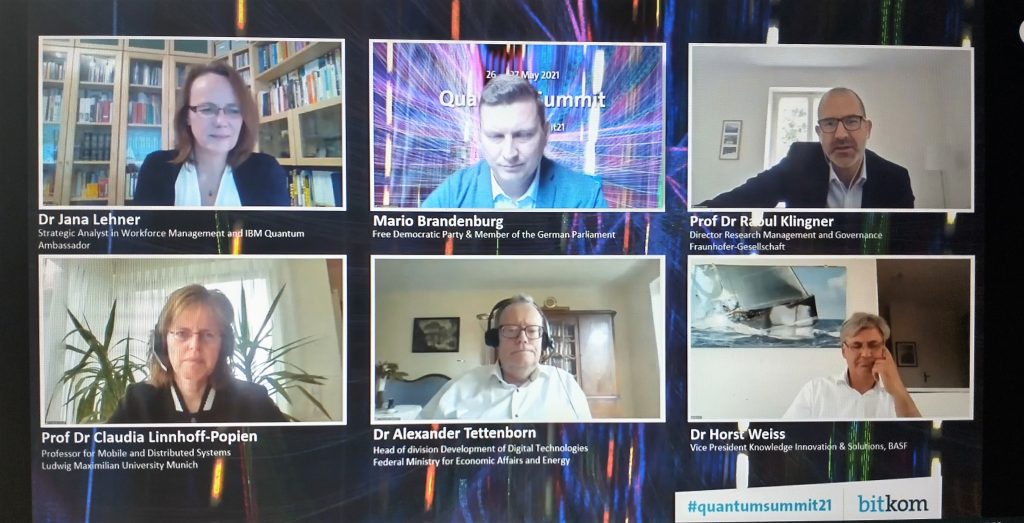Prof. Linnhoff-Popien participates in panel discussion of the Bitkom Quantum Summit
Prof. Linnhoff-Popien participates in panel discussion of the Bitkom Quantum Summit
(May 26, 2021, Berlin). There are great future visions: Germany has set itself the goal of becoming a pioneer in the future field of quantum technologies. The German government is supporting the development of quantum technologies with two billion euros from the economic stimulus package. Computer science professor Dr. Claudia Linnhoff-Popien was a member of the Federal Government’s Expert Council on Quantum Computing in 2020/21 and is very familiar with the state of research and the practical applications that are already possible.
At her Chair of Mobile and Distributed Systems at the Institute of Computer Science at Ludwig-Maximilians-University Munich (LMU), research and programming has already been ongoing since 2016 in the Quantum Applications & Research Laboratory (QAR-Lab).
During the Bitkom conference “Quantum Summit” (May 26-27, 2021) Claudia Linnhoff-Popien spoke about the developments in Germany. At the panel she gave an outlook on the objectives at her chair:
“I am very happy to support the application-oriented side of Quantum Computing. From my point of view, Germany is very strong in the user industry. We are world champions in the automotive field, in mechanical engineering and in other areas. We have a strong user industry on one side – and on the other side we have the groundbreaking possibilities of quantum computing. And these two sides are now growing together. We have to focus on two goals in Germany: On the one hand, we should build one or two quantum computers. And on the other hand, we need to program applications that run on quantum computers, the currently available NISQ computers. My personal goal is that we now prepare for the age of quantum computing to achieve a quantum advantage in four to seven years.”
Representatives from other institutions and companies who spoke on the panel about Germany were:
- Mario Brandenburg, Free Democratic Party & Member of the German Parliament
- Prof Dr Raoul Klingner, Fraunhofer-Gesellschaft
- Dr Alexander Tettenborn, Federal Ministry for Economic Affairs and Energy (Head of division Development of Digital Technologies)
- Dr Horst Weiss, BASF (Vice President Knowledge Innovation & Solutions)
- Dr Jana Lehner, Strategic Analyst in Workforce management at IBM was presenter at the event.

High hopes on fast pace of developments and barrier-free access to the technology
The speakers expressed different wishes about the speed of developments in Germany and agreed that the access to the technology should be as low-threshold and barrier free as possible. All participants were enthusiastic about quantum computing as a crucial future technology. The conference devoted two days exclusively to the topic of quantum technologies, illustrating how, after years of research, the topic has arrived in industry.
In Germany, there are many co-existing initiatives in research and industry that have excellent know-how about quantum computing and are increasingly applying the knowledge to applications. At the Institute of Computer Science at Ludwig-Maximilians-Universität (LMU) in Munich, research and programming has been carried out in the QAR Lab since 2016. The knowledge gained from years of research flows into considerations of real-world use cases with industry partners to program initial use cases on the computers.
The QAR-Lab has access to four quantum computers. Under the motto “Become Quantum ready,” the experts have set themselves the goal of supporting as many users as possible from science and industry in the field of quantum computing with their expertise.
Claudia Linnhoff-Popien concluded by saying that she is very proud of the PlanQK project and that the QAR Lab is among the top research institutes in the world: “We are also hosting a challenge at the chair until July with four industrial companies and 27 students who are programming use cases on different quantum computers. I think we’ve done a good job for many years already and we are in a good position for the future.”
More info: Quantum Summit 2021

